|
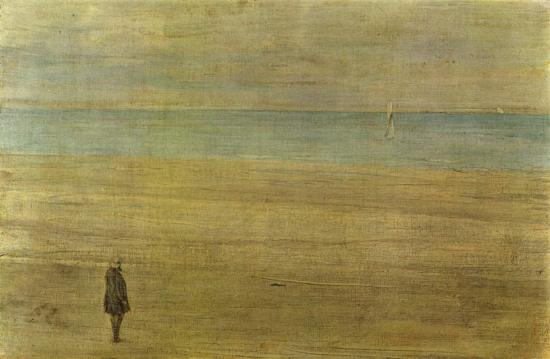
Trouville
Whistler
1865
_______________________
“This World, or the Man of the Boxes”
Dedicated to Joseph Cornell
Takahashi Mutsuo
Translation from Japanese by Jeffrey Angles
presented by Jerome Rothenberg
The world to which this man really belongs is not here
The world to which this man really belongs
Is far away through the fissures of dream
Guarded by sensible, steadfast parents
This man wearing a starched collar is a clever boy
He has two beautiful younger sisters
And a younger brother with an upright spirit
This family of angels with wings hidden under their fancy dress
Is enveloped in golden happiness
That world of distant memories
Is like a box floating in a galaxy of tears
*
One morning suddenly that box-shaped boat ran ashore
In the doorway to that timeless world of happiness
When was that? A second or a hundred million years ago?
Dreams are always nightmares interlopers with foul intent
Drawn by death the father was pulled backward
And the rest of the family were dragged quickly away
It was here they disembarked the backyard of a sickly city
Here not even angels could escape human fate
The mother grew ill from anxiety the sisters grew thin
And wrinkles spread across the brother’s spotless soul
...(more)
Poems by Takahashi Mutsuo
translated from the Japanese by Jeffrey Angles Intersections: Gender, History and Culture in the Asian Context
_______________________

Nina Leen
Dial W for Weimar
a celebration of the telelphone
_______________________
from Meddle English
Caroline Bergvall
sibila
(....)I repeat what many have said, that poetic or art language must not implicitly be held to account of identities and national language, the seductions of literary history, or the frequently fetishistic methodologies of art movements, but rather seek, far and close, the indicators and practices of language in flux, of thought in making: pleasured language, pressured language, language in heated use, harangued language, forms of language revolutionized by action, polemical language structures that propose an intense deliberate reappraisal of the given world and its given forms.
More often than not, we each use a voice that speaks for us before we get to speak. Quite apart from the ideological implications and beyond palliative arts methodologies, this is why so many of us spend so much of our lives and imagination working at the undoing of a voice or identity we do not wish to be tagged as and questioning the methods of environments we might not wish to represent. It is through this confusing, seemingly self-defeating process of dissociation, of "disloyalty", that other forms of allegiances are made manifest and other conductor channels can be generated.
To meddle with English is to be in the flux that abounds, the large surf of one's clouded contemporaneity. It is a process of social and mental excavation explored to a point of extremity. One that reaches for the irritated, excitable uncertainties of our embodied spoken lives by working with, taking apart, seeing through the imposed complicities of linguistic networks and cultural scaffolds. One which is not only prompted to recognizes what it wishes to fight against: what sedates, what isolates, what immobilizes, what deadens, what perpetuates. But works at it tactically, opportunistically, utilising at will and with relish the many methods, tools, abilities and experiential attitudes it needs. Making a workshop of the surrounding world. Oiling creativity and artistry with critical spirit, since there can be no revolt nor renewal without creative impulse, without anarchic pleasure, without a leap in the dark....(more)
Caroline Bergvall at EPC and Penn Sound.....................................................
Caroline Bergvall's "Meddle English"
Charles Bernstein
(....)
In addition to its opening work of poetics, Meddle English includes a substantial selection of the Bergvall's remarkable Chaucerian vocal insinuations and extensions, as well as many other works that skirt the boundaries among sound/performance/visual/textual. Bergvall's Meddle English dwells in the space between languages, which for her is not an abstraction, not an idea, but an embodying/enveloping ground. Moving from but burrowing into ESL/PSL (English/poetry as a second language), Bergvall's bravura performances move toward a fluid third term, not bilingual but n-lingual, as in the the final section of "Cropper," woven with permutations of an English phrase in Norwegian and French, which brings us back around to her layered excavations of middle English, where the old literally melts into the new. Bergvall's is a poetics of "disfluency" (as Jordan Scott uses the term), where blockages, stuttering, error, and skips are not fragments of lost whole but stiches that make up a fabric. In Meddle English the frogs in our throats become catnip. ...(more)
_______________________
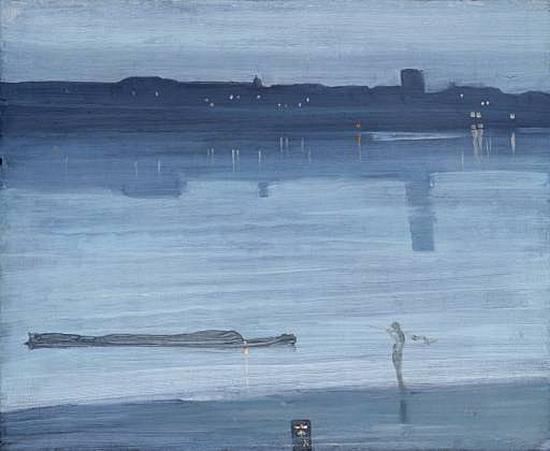
Nocturne: Blue and Silver - Chelsea
1871
James Abbott McNeill Whistler
(July 10, 1834 — July 17, 1903)
_______________________
Thomas Baumgartner of France Culture Radio selects UbuWeb's Top Ten for July
_______________________
125 Science Videos
Open Culture
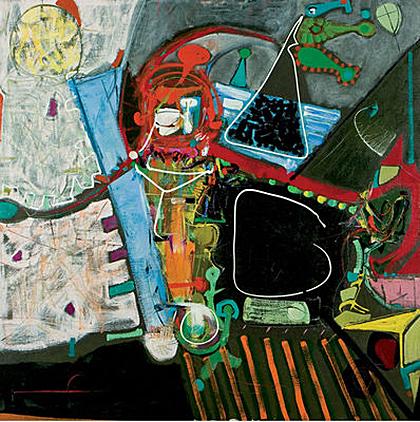
Faēade and Celebration
Harold Town
b. June 13, 1924
_______________________
Passage Without Rites
Philip Edmund Booth
(October 8, 1925- July 2, 2007)
Homing, inshore, from far off-soundings.
Night coming on. Sails barely full.
The wind,
in its dying, too light to lift us against
the long ebb.
My two fingers, light
on the tiller, try to believe I feel
the turned tide.
Hard to tell. Maybe,
as new currents pressure the rudder,
I come to sense
the keel beginning
to shape the flow of the sea. Deep
and aloft, it's close
to dark.
No stars yet. Only the risen nightwind,
as we tack into its warmth,
tells us
we'll make our homeport. Strange,
angling into the dark,
to think
how a mainsail's camber reflects
the arc of the keel,
their dynamics
reversing whenever we tack.
You call from below,
hand up coffee,
check the glow of the compass, and
raise an eye to Arcturus,
just now
beginning to shine. All over again,
all over, our old bodies
breathe
the old mysteries: the long night
still to go, small bow-waves
playing
a little nachtmusik; stars beyond stars
flooding our inmost eyes.
And voices,
now, come out of the dark,
deeply sounding our own.
_______________________
I Thought You Were a Poet
A Notebook
Joshua Mehigan
(....)
People still think of poets as an odd bunch, as you’ll know if you’ve been introduced as one at a wedding. Some poets spotlight this conception by saying otherworldly things, playing up afflictions and dramas, and otherwise hinting that they might be visionaries. In the past few centuries, of course, the standard picture of psychopathology has changed a great deal. But as it’s often invoked, the idea of the mad poet preserves, in fossil form, a stubbornly outdated and incomplete image of madness. Modern psychiatry and neuroscience have supplanted this image almost everywhere else. It’s true that these sciences are still young and still vexed by Freud’s ghost. But, in spite of horrors like insulin shock therapy, lobotomy, and overmedication, they’ve given us the crucial knowledge that insanity is not caused by supernatural forces, lovesickness, or wrath. They’ve dispelled unhelpful belief in conditions like spirit possession, tipped uterus, astral misalignment, and humorous imbalance. True, older medicine created those beliefs. But science, unlike magic, has the advantage of changing course, and slowly there emerge life-changing legislation and therapies. In 1961, Michel Foucault worried about the consequences of this new paradigm, but fifty years later the Stultifera Navis sails upstream to the heart of Poetryland. In his conclusion to Madness and Civilization, discussing Artaud, Nietzsche, and Van Gogh, Foucault writes: “madness is precisely the absence of the work of art.”...(more)
Joshua Mehigan at the Poetry Foundation
_______________________
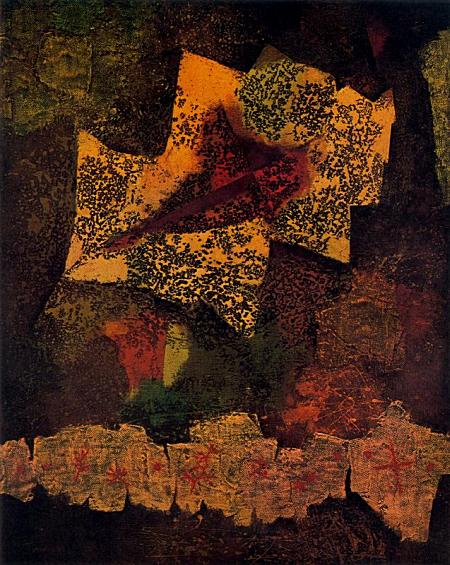
Testament of a Dead Leaf
1959
Mordecai Ardon
b. July 13, 1896
_______________________
Homage To Georges Perec
An Entertainment in Six Univocalisms
Ian Monk
4. Downtown
To do or not to do: Gods, how to opt?
For who knows good from wrong, or wrong from good;
who'd follow forlorn lords, bow down to clods,
stoop to Sodom, boom songs of so long loss,
or dog coxcombs, hobnob to hollow loons;
who'd down hootch, long for boons Gods know not of;
who'd drool onto dons, for whom tomfools blot
drops onto books, or low words (how now brown cow?);
who'd smooth wrongs, mock worlds from top to bottom,
or crow to crowds for blood; who'd doctor horrors,
or woo doom's pogroms, Lot's loss, Bloom's sorrows,
or woof of wolf or woof of Clotho's loom?
So do not! Good's soon wrong, wrong's soon good for
tomorrow, tomorrow, for tomorrow.
...(more)
ebr10 - writing under constraint
_______________________
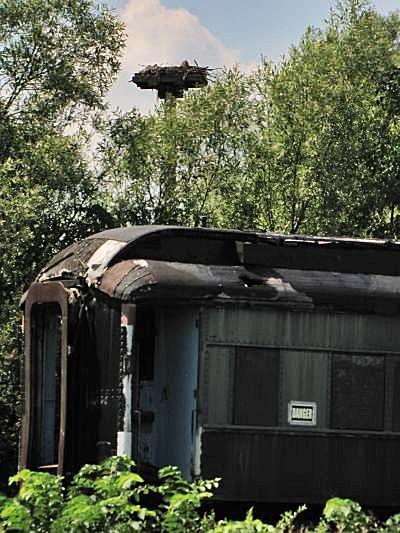
photo - mw
_______________________
Talk About Walking
Philip Booth
Where am I going? I'm going
out, out for a walk. I don't
know where except outside.
Outside argument, out beyond
wallpapered walls, outside
wherever it is where nobody
ever imagines. Beyond where
computers circumvent emotion,
where somebody shorted specs
for rivets for airframes on
today's flights. I'm taking off
on my own two feet. I'm going
to clear my head, to watch
mares'-tails instead of TV,
to listen to trees and silence,
to see if I can still breathe.
I'm going to be alone with
myself, to feel how it feels
to embrace what my feet
tell my head, what wind says
in my good ear. I mean to let
myself be embraced, to let go
feeling so centripetally old.
Do I know where I'm going?
I don't. How long or far
I have no idea. No map. I
said I was going to take
a walk. When I'll be back
I'm not going to say.
thanks to Richard Hoffman at Mnemosyne's Memes
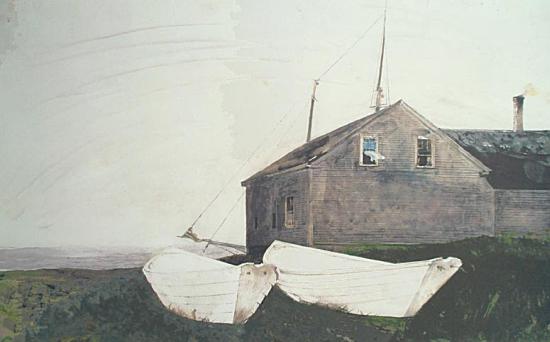
The Sisters
1990
Andrew Wyeth
July 12, 1917 - January 16, 2009
_______________________
from
Heights Of Macchu Picchu [pdf]
Pablo Neruda
b. July 12, 1904
translated by John Felstiner
janus head
(....)
In the wave-strike over unquiet stones
the brightness bursts and bears the rose
and the ring of water contracts to a cluster
to one drop of azure brine that falls.
O magnolia radiance breaking in spume,
magnetic voyager whose death flowers
and returns, eternal, to being and nothingness:
shattered brine, dazzling leap of the ocean.
Merged, you and I, my love, seal the silence
while the sea destroys its continual forms,
collapses its turrets of wildness and whiteness,
because in the weft of those unseen garments
of headlong water, and perpetual sand,
we bear the sole, relentless tenderness.
Stone upon stone, and man, where was he?
Air upon air, and man, where was he?
Time upon time, and man, where was he?
Were you too then the broken bit
of half-spent humankind, an empty eagle, that
through the streets today, through footsteps,
through the dead autumn’s leaves,
keeps crushing its soul until the grave?
The meager hand, the foot, the meager life . . .
Did the days of unraveled light
in you, like rain
on pennants at festival,
give off their dark food petal by petal
into your empty mouth?
Hunger, coral of humankind,
hunger, hidden plant, root of the woodcutter,
hunger, did your reef-edge climb
to these high and ruinous towers?
I question you, salt of the roads,
show me the trowel; architecture, let me
grind stone stamens with a stick,
climb every step of air up to the void,
scrape in the womb till I touch man.
Macchu Picchu, did you set
stone upon stone on a base of rags?
Coal over coal and at bottom, tears?
Fire on the gold and within it, trembling, the red
splash of blood?
(....)
Janus Head
_______________________
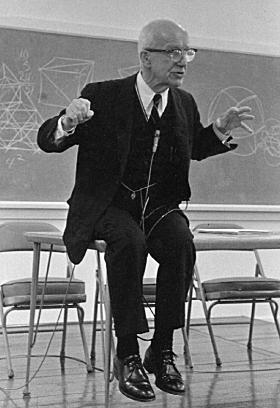
Buckminster Fuller
b. July 12, 1895
Everything I Know
The Historic 42-hour Session with Buckminster Fuller
recorded 1975
[MP3s]
seedy
_______________________
Trickle-Down Cruelty and the Politics of Austerity
Henry A. Giroux
(....)What should be clear is that the politics of austerity is not about rethinking priorities to benefit the public good. Instead, it has become part of a discourse of shame, one that has little to do with using indignation to imagine a better world. On the contrary, shame is now used to wage a war on the poor rather than poverty, on young people rather than those economic and political forces that undermine their future and on those considered other rather than on the underlying structures and ideologies of various forms of state and individual racism.
As the welfare state is dismantled, it is being replaced by the harsh realities of the punishing state......(more)
_______________________
Greece a Dress Rehearsal for United States
Michael Hudson
... what's happening in Greece is a dress rehearsal for what's going on in the United States. Already, a few weeks ago in Athens, the protestors had signs up referring to Wisconsin and the problems here. What's happening in Greece in the last week is exactly what's happened in Minnesota with the close-down of government. And the demands of privatization--Greece sell off its roads, its land, its port authority, its water and sewer--is just what Illinois's been doing, what Chicago's been doing, what Minnesota's been told to do, and what American cities are trying to do. So you have an identical strategy being used between Greece and the United States. Greece is the first domino since Iceland. And the financial interests that are looking at this post-2008 debt crisis as a grab bag think now is the chance for us to make our move. Now we can take all this debt that we've built up and we can get out of the financial system, we can turn it into direct ownership of property. We can own the Greek islands, we can own the Greek public domain, just like we can own what Minnesota, Chicago, Wisconsin, and California own. And all of a sudden you have a huge virtual foreclosure process....(more)
_______________________

An Estuary in Brittany
Eugčne Boudin
b. July 12, 1824
_______________________
Waltzing at the Doomsday Ball
Capitalism is dead, but we still dance with the corpse
Joe Bageant
As an Anglo European white guy from a very long line of white guys, I want to thank all the brown, black, yellow and red people for a marvelous three-century joy ride. During the past 300 years of the industrial age, as Europeans, and later as Americans, we have managed to consume infinitely more than we ever produced, thanks to colonialism, crooked deals with despotic potentates and good old gunboats and grapeshot. Yes, we have lived, and still live, extravagant lifestyles far above the rest of you. And so, my sincere thanks to all of you folks around the world working in sweatshops, or living on two bucks a day, even though you sit on vast oil deposits. And to those outside my window here in Mexico this morning, the two guys pruning the retired gringo's hedges with what look like pocket knives, I say, keep up the good work. It's the world's cheap labor guys like you -- the black, brown and yellow folks who take it up the shorts -- who make capitalism look like it actually works. So keep on humping. Remember: We've got predator drones. ...(more)
_______________________
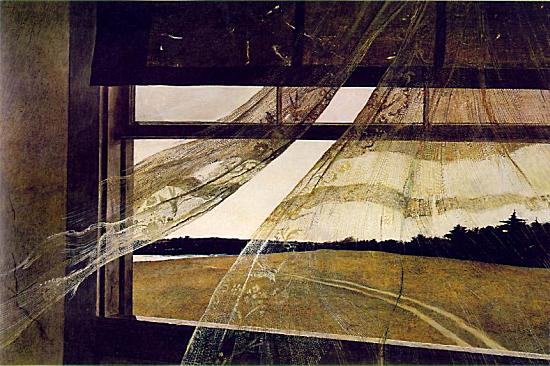
Wind from the Sea
Andrew Wyeth
1948
_______________________
We have inherited this damaged life of peoples dragging behind them the burden of the condemnation of centuries, the most paradisaical of peoples, the purest, those who with stones and metals made marvellous towers, jewels of dazzling brilliance - peoples who were suddenly despoiled and silenced in the fearful epochs of colonialism which still linger on.
-
Pablo Neruda,
Towards the Splendid City
Nobel Lecture, December 13, 1971
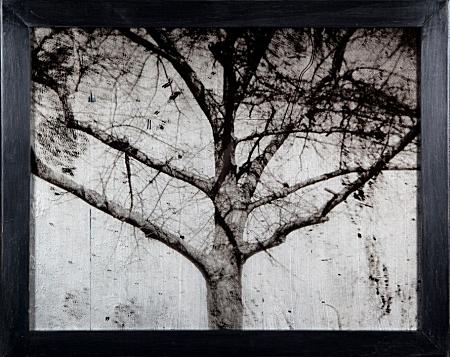
The Forest and the Tree
2009
Louviere + Vanessa
Exquisite Collaborations:
Concerto da camera
Jeff Louviere and Vanessa Brown
Andrew Smith Gallery
July 1 - Sept. 10, 2011
via
_______________________
The Perfect Crime
Jean Baudrillard
translated by Chris Turner
ifile pdf
Were it not for appearances, the world would be a perfect crime, that is, a crime without a criminal, without a victim and without a motive. And the truth
would forever have withdrawn from it and its secret would never be revealed, for want of any clues [traces] being left behind.
But the fact is that the crime is never perfect, for the world betrays itself by appearances, which are the clues to its non-existence, the traces of the
continuity of the nothing. For the nothing itself -- the continuity of the nothing -- leaves traces. And that is the way the world betrays its secret. That is the
way it allows itself to be sensed, while at the same time hiding away behind appearances.
The artist, too, is always close to committing the perfect crime: saying nothing. But he turns away from it, and his work is the trace of that criminal
imperfection. The artist is, in Michaux's words, the one who, with all his might, resists the fundamental drive not to leave traces.
The perfection of the crime lies in the fact that it has always-already been accomplished -- perfectum. A misappropriation of the world as it is, before it
even shows itself. It will never, therefore, be discovered. There will be no Last Judgement to punish or pardon it. There will be no end, because things have always-already happened. Neither resolution nor absolution, but inevitable unfolding of the
consequences. Precession of the original crime -- which we might perhaps be said to find in derisory form in the current precession of simulacra. After
that, our destiny is the accomplishment of this crime, its inexorable unfolding, the continuity of the evil, the continuation of the nothing. We shall never
experience the primal scene, but at every moment we experience its prolongation and its expiation. There is no end to this and the consequences are
incalculable.
Just as we cannot plumb the first few seconds of the Big Bang, so we cannot locate those few seconds in which the original crime took place either. It is a
fossilized crime, then, like the `fossilized' background noise scattered about the universe. And it is the energy of that crime, like that of the initial
explosion, which will spread through the world until, perhaps, it exhausts itself.
This is the mythic vision of the original crime, the vision of the alter-ation of the world in the play of seduction and appearances, and of its definitive
illusoriness.
This is the form the mystery takes.
The great philosophical question used to be `Why is there something rather than nothing?' Today, the real question is: `Why is there nothing rather than
something?'
_______________________
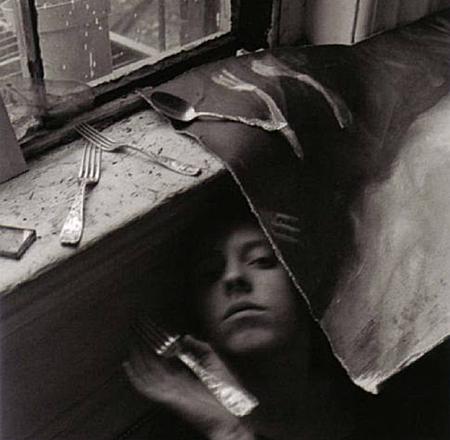 Francesca Woodman
1958 - 1981
.....................................................
The Long Exposure of Francesca Woodman
Elizabeth Gumport
... what accounts for the current wave of interest in Woodman? Why do young artists in particular consider her a “rock star,” as one photography professor puts it in The Woodmans? A note Woodman wrote on the edge of an early print perhaps provides a clue: “There is the paper and then there is the person.” Self-portraits, once a challenge, are now the easiest kind of image to produce. We just face our laptop and it snaps a picture or records a video. In this position, taking photographs feels exactly like not taking photographs, and being recorded is just like being: we sit back, or type, or wander away. We are increasingly unable to register the creation of an image as a particular, contingent event, and many of the pictures we see are as unmemorable as the circumstances in which they were created.
Perhaps this is why Woodman, who produced in her entire life fewer pictures than are uploaded to Facebook every second, has lately been attracting our attention. Her images offer our atrophied organs of perception occasion to exert themselves, forcing us to focus on the moment of their creation. Woodman often planned her pieces far in advance, sketching them as a painter might, and in her journal characterized one of her long exposures as a portrait of “legs—and time.” Her wording recalls a statement issued by early photographer William H. Fox Talbot in the 1830s, when he praised the infant medium’s ability to document “the injuries of time.” He had in mind the comparison of two photographs—one old, one new, both of the same subject.
Woodman reveals the injuries that occur in the time it takes to produce a single picture: hair turns wispy, flesh fades and stretches into smoke. The longer her shutter stays open, the blurrier and more transparent bodies will appear, until at last they disappear. Shortly before her death, she began experimenting with a particularly long development process that required her to spend several hours producing a single photograph. In the end, her camera captures not the girl but the long moment it looked at her....(more)
.....................................................
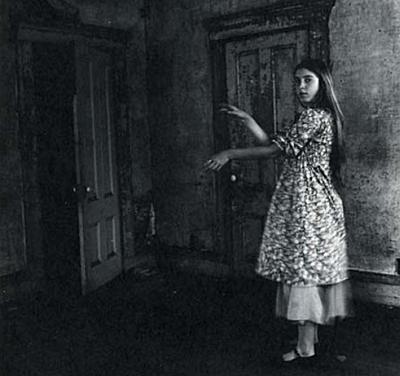
Francesca Woodman
_______________________
Island
Valzhyna Mort
guernica
(....)
A body strips down all the way to forgiveness,
and grants itself before there’s even a reason, unless
it wants to tell the other: I forgive your juices
for not filling these hard fruits; your skin
for not cracking and rotting over the ants’ heads;
I forgive your throat for not birthing the dog’s cough;
your hand, right now rising, falling, and leaving trace
unlike what it praises; your shadow for never becoming a stain
to mark this road, this bed, but mostly this sea.
Bricks of gray moonlight fall weightlessly
through
the wooden
shades building a new wall above the sink.
Here he lies on his stomach,
the gap between his ass and his thighs
forms a perfect black diamond.
Horizon blistered by the setting sun heals
leaving
a hardly visible scar.
Guernica
_______________________
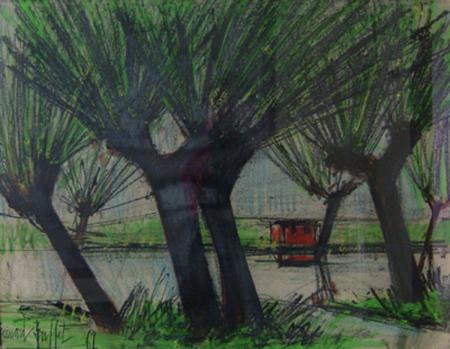
Bernard Buffet
1962
_______________________
On The First Socialist Tragedy
Andrei Platonov
(....)
The tragedy of man, armed with machinery and a heart, and with the dialectic of nature, must be resolved in our country by means of socialism. But it must be understood that this is a very serious task. The ancient life on the ‘surface’ of nature could still obtain what it needed from the waste and excretions of elemental forces and substances. But we are making our way inside the world, and in response it is pressing down upon us with equivalent force....(more)
_______________________
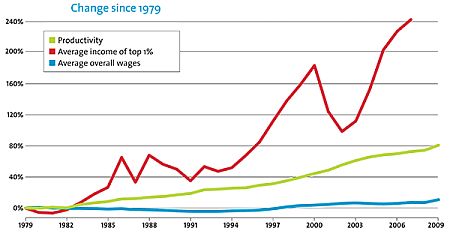
12 Charts that Will Make Your Blood Boil
mother jones
_______________________
“Melancholy redeems this universe, and yet it is melancholy that separates us from it.”
-
E. M. Cioran
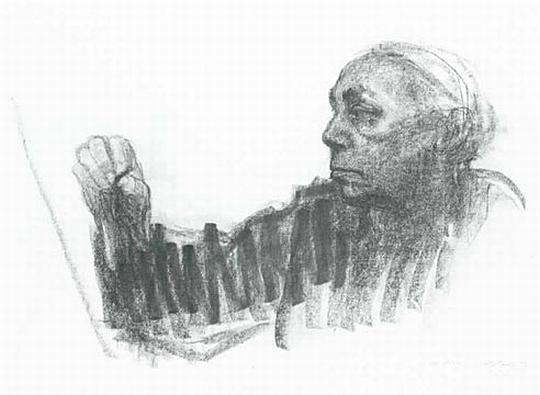
Self-Portrait
1924
Käthe Kollwitz
(July 8, 1867 – April 22, 1945)
_______________________
What we talk about when we talk about letters
William Huntting Howell reviews In My Power: Letter Writing and Communications in Early Americaby Konstantin Dierks
common-place
"We Used to Wait," the second single from Arcade Fire's The Suburbs (2010), begins like most of the songs on the record—with a lamentation. The speaker distills his experience of suburban or exurban disaffection into a considerably less abstract set of images: "I used to write / I used to write letters / I used to sign my name / I used to sleep at night / Before the flashing light settled deep in my brain." The line between the better past and the bitter present registers as an epistolary problem: before, there were letters and signatures—markers of an active self recording its own presence, leaving material traces of social relations—now, without the writing of letters, there is only sleeplessness and impotence. The flashing light is imperial, too much for the speaker to handle: the space of the suburb (in all of its ideological complexity) has separated him from the life he had and the future he had imagined. As the song progresses, though, there's a critical shift. In spite of the helplessness, the "wilderness downtown," the structural impossibility of living in the post-modern age, the speaker finds defiance: "I'm gonna write / A letter to my true love / I'm gonna sign my name / Like a patient on a table / I wanna walk again / Gonna move through the pain." Letter writing becomes the first stage of a larger awakening—the speaker's recuperation of his will, of his sense that the external forces aligned against him (here rendered as injury or disease) may be countered effectively. As a concrete assertion of the self and its relations to others—the "I" and the "true love"—the logic of the letter works against the logic of social and cultural alienation.
As it happens, this relationship between the letter and the empowered self that Arcade Fire describes has a long history. In his closely argued, deeply researched, and unfailingly engaging In My Power, Konstantin Dierks takes on the personal side of the burgeoning documentary culture of the seventeenth- and eighteenth-century anglophone Atlantic. Amassing and interpreting a remarkably broad archive of correspondence (by merchants and diplomats, housewives and frontiersmen, children and generals) Dierks finds in the material and rhetorical practices of letter writing new ways of understanding the relationship between Enlightenment-era Britons and the ideologies that structured their lives. Ultimately, he argues that the production and circulation of letters become a way of articulating individual agency against a backdrop of massive social change....(more)
_______________________
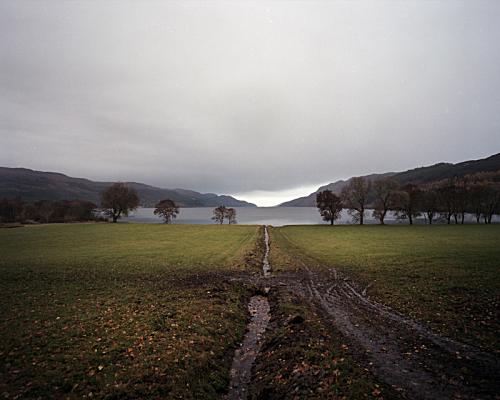
Lock Ness
Jamie Stoker
_______________________
Ontology at Present Tense.
Community and Immunity in the Global Times
Roberto Esposito
Translated by Andreea Lazar
Everywhere new partition walls appear, new restriction areas, new lines of separation from something that menaces or, at least seems to menace the biological, social, environmental identity. It is as if we had paroxistically intensified that fear of being touched – even by mistake – that Elias Canetti already, referring to the origin of our modernity, had identified in a short circuit between tact, contact and contagion. The contact, the relationship, the collective bounds seem to collapse immediately under the risk of contamination.
Here lies the terrible contradiction to which we must apply ourselves: whatever saves the individual and collective body is also what restricts its development and even what, over a certain limit, eventuates in destroying it. It could be told that – in the idiom used by Walter Benjamin, who actually died because of the closure of a border – the high-dose immunization means the sacrifice of the living being, which is the sacrifice of any qualified life form, for the sake of the simple survival. That is the bringing down of life to its biologic nudity, the reduction of bios to zoé.
(...)
These two truths, one full, the other empty, one self-evident in its own presence, the other secluded in its own absence, but both absolute, exclusive and exclusivistic, are the ones that encounter, within the same immunization obsession, in the attempt to conquest the global world, the globality of a self-reflected world, self-sufficient up to explosion. Political monotheism – the idea that there must be a unique king and a unique kingdom to comply with a unique god – expresses the actual essence of the most violent version of the immunization: the closure of the borders which tolerate nothing outside them, that exclude the mere idea of any exterior, that do not accept any otherness that could menace the logic of One-whole....(more)
_______________________
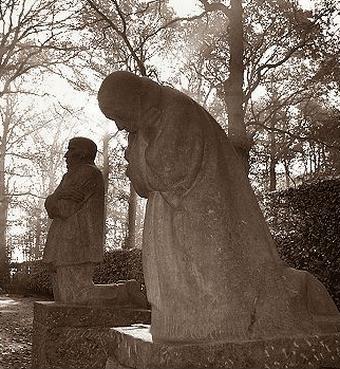
The Mourning Parents
Käthe Kollwitz
1932
Vladslo German Cemetery
_______________________
Presente!
Western martyrdom and the politics of memory and death
Michael Azar
Translation by Henning Koch
eurozine
(....)
The question of historical memory could feasibly be studied as a sub-division of a political field that might be referred to as the politics of death – necropolitics. How is death and remembrance of the dead instrumentalized and exploited for political purposes? The politics of death is not only about real or threatened murders and massacres of living human beings, but also the manner in which the living utilise those who are already dead. The writing of history, remembrance ceremonies, death cults, funeral rituals – there are many ways of re-awakening the spirits of past years and enacting resurrections. One can exploit the dead: their names, words, fighting roles and costume to implement one's own demands in disguise, and take revenge on one's enemies. But the dead can also be temporarily recalled to the realm of the living in order to be able to declare them dead once and for all....(more)
_______________________
War Is the Health of the State
Randolph Bourne
_______________________
Tomaž
Šalamun
World Poetry Portfolio #28
Trans-Siberia
translated from the Slovenian by Michael Biggins with the author
Every ball is a bloody, beautiful mask of
powerful people. We make up
pretzels. I always did like chickens.
O, slender fez, mildew perching on its fur.
The poet is an oafish celeb on a hood.
Of every wondrous power. On a hood.
I glance over my right shoulder and see
a lake with the canon bathing in it.
The marmots that shot past me weren’t
marmots. Come on, god, sail off to abstraction.
Stepfather! Your mouthful eats soup, you only see it.
Nem Keckeget arrives in Japan and jumps down. ...(more)
Tomaž
Šalamun at Poetry International Web and the Poetry Foundation
_______________________
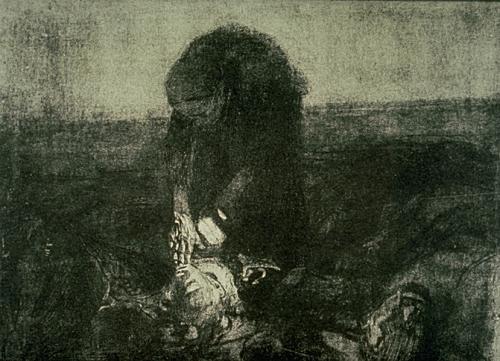 After the Battle
1921
Käthe Kollwitz
Weimar
_______________________
Translations of five poems by Julia Piera
by Forrest Gander
from Panic Cure: Ten Innovative Contemporary Poets from Spain, edited and translated by Forrest Gander.
nthposition
(....)
And so it begins again,
lugging the politics of fear on her shoulders
teeth sweating pure rage
a chest for the fencing of sobs
between garbage, screen,
cumulus succubus of garbage...
the terror with a cursor in its burned little hand
screensavers, multiethnic
"personalized," just for her,
from a white balcony
of grates and pitas
the b. skips,
digital gladiolus
and something immense
plunges
...(more)
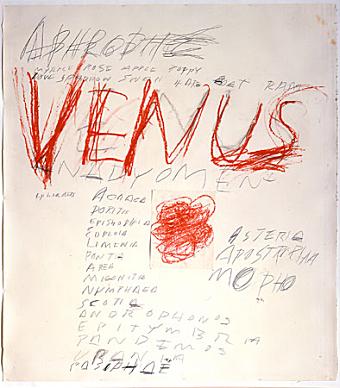 Venus
1975
Cy Twombly
(April 25, 1928 – July 5, 2011)
_______________________
In Zen (the practice of being radically awake), one of the most stinging indictments is to observe that someone’s actions or reactions “stink of Zen.” That means “it’s getting old.” In Zen, the idea is to have “beginner’s mind,” which is the child’s mind, for which all activity is discovery, and everything is new. Surrealism, which in many ways shares this Zen sensibility, is subject to the same malady. Some surrealist games seem too much like surrealist games. Some automatism seems too automatic, in the mechanistic sense of the term. If we seek surreality, it’s important that we never forget Heraclitus’s warning always to expect the unexpected lest when it occurs we won’t notice it. He probably mentioned in some lost fragment that we need also to practice “unexpecting the expected.” Expecting the unexpected and unexpecting the expected are eminently surrealist exercises.
Surrealpolitik Max Cafard exquisite corpse
... there are several works that go a long way in exploring the momentous topic of surrealism and the political. Much of what follows are comments and reflections inspired--or provoked--by Michael Löwy’s recent work, Morning Star: Surrealism, Marxism, Anarchism, Situationism, Utopia , though several other important works that confront the question of surrealism and politics will also be discussed. The primary rationale for this reflection on surrealpolitik is to recognize the depth of the surrealist roots of anarcho-surre(gion)alism. As will become obvious, the focus here is also on defending the anarchistic basis of surrealistic politics and sometimes with demolishing Löwy’s case for collapsing together anarcho-surrealism and Troskyism. ...(more)
_______________________
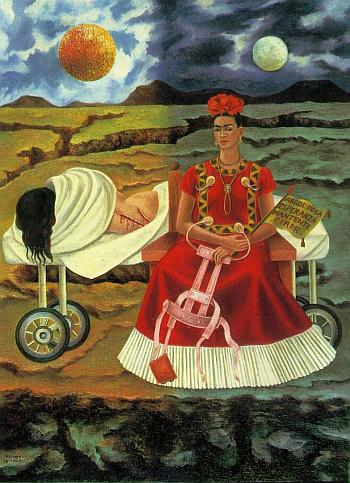
Tree of Hope
1946
Frida Kahlo
b. July 6, 1907
_______________________
Costs of War
(Eisenhower Study Group, Brown University and Watson Institute for International Studies)
What Bin Laden Won: $4.4 Trillion in War Costs
Jennifer Depaul
The Fiscal Times
Perpetual Motion
Why the War Machine Keeps on Running
Franklin C. Spinney
_______________________
Knots
R.D. Laing
mediafire pdf
They are playing a game. They are playing at not playing a game. If I show them I see they are, I shall break the rules and they will punish me.
I must play their game, of not seeing I see the game.They are not having fun.
I can’t have fun if they don’t.
If I get them to have fun, then I can have
fun with them.
Getting them to have fun, is not fun. It is
hard work.
_______________________
An Odd Owner
Kono Taeko
Translated by Goro Takano
The Center for the Art of Translation
background note
Goro Takano
The translation process required special work to tackle the following problems:
(1) The original Japanese text is narrated in the past tense. But I felt that, in English, the past-tense narration might not sufficiently illuminate the story’s unique otherworldliness. Thus, I took the risk of translating it in the present tense.
(2) I had trouble with translating several culturally specific terms on Japanese-style funerals and furniture. In each case, in order to maintain the story’s readability for non-Japanese audiences, I inserted additional information into its original context.
(3) This short story’s charm lies partly in its narration’s weird logic. Yet, several sentences in the original text (the ones in the Japanese-civil-law-related section, particularly) seemed too illogical to me to follow. Thus, without damaging the original’s haunting weirdness, I sorted out a few excessive irregularities in the narrator’s line of thought.
_______________________
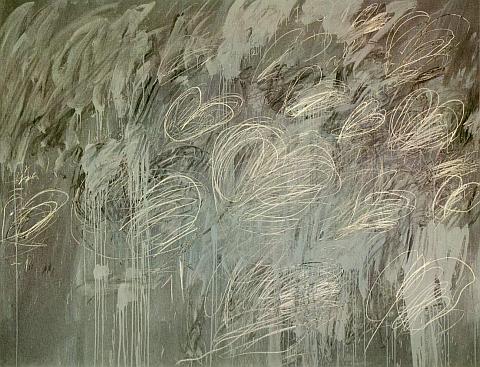
Cy Twombly
1968
_______________________
A Translation of "Holzfällen / Wien 1984"
(Thomas Bernhard Interviewed by Krista Fleischmann)
... Thirty years after the fact it’s certainly not the period [itself] that excites you, but the memory [of it], which you make present to yourself, and then you notice that it’s all basically [composed of a bunch of] more or less open wounds; you squirt a bit of poison into them, and the whole thing catches fire, and then an excited style materializes. And then, you know, certain people cross your path and when you see them, they, you know, drive you crazy, and then you introduce them into just this genre of book, namely an excitation.
But surely with distance one ought to be able to write about the past more composedly.
That’s the big cliché about contemplating the past, and it’s obviously totally false. Old people can write books like that when they’re sitting paralyzed in their armchairs, but it’s not my mode, not yet; maybe the day after tomorrow I’ll still be excited; whenever I write anything, even something peaceful, I’m still basically excited. In any case, excitation is a pleasant condition; when your blood is sluggish, excitation gets it moving, pulsing; it keeps you alive, and consequently keeps the stream of books flowing. Without excitation there’s absolutely nothing; you might as well stay in bed. ...(more)
via Steve Mitchelmore
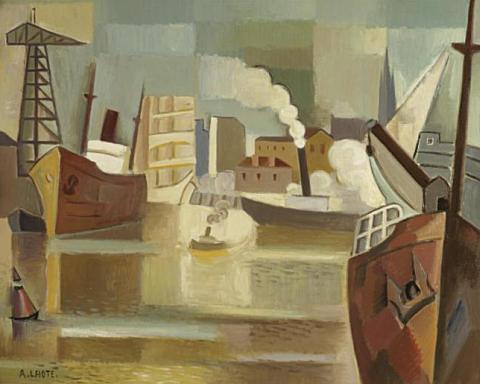
André Lhote
b. July 5, 1885
_______________________
from Redstart
Forrest Gander
***
Where cocked ear to river
registers silt and
leachate scouring
boulders, water‘s oracular
interior, quartz clatter
at edge and break
brecciated
cataracts of whirled
sound, gusting
rain, ripple-drifts
across swirl
over swallet hole
where plastic
bottles trail the skiff
all current and sun, thrush,
retina. Kingfisher
swoop, an inseminating
gesture as
we - in our porous skinsll
continuous with,
indistinguishable
from—
***
...(more)
Dublin Poetry Review
_______________________
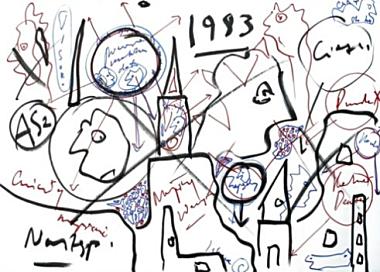
DEUTER KELNER I-VI
Grzegorz Wróblewski
The Post-Literate (R)Evolution
_______________________
Poems by the Baroness Elsa von Freytag-Loringhoven
jacket2
Hell’s Wisdom
My "Derangement" dwells in absence – as – under circumstances existing – normally – it
should be present.
It maintains in circumstance –
There I leave it.
My being in senses right is normal height.
It being uncommon – presents strange - as genius does - uncompanioned.
Victim of circumstance I am not – as I am no dweller in
For me - to be touched - touchably - by circumstance - normal
To vacuous spectres of substance past - should so be abnormal – as to cause revulsion
degree –
Provoking instant insanity – whence I am protected by radius of spiritual emanation
To circumstance I am immaterial - as is circumstance to me.
Diametricaly opposed - alone we leave each other - charmed aloft
Lone I - enhanced shrouded earth – by own atmosphere mine self’s own self – out-of
circumstance cosmic star - volve revolve - evolve -I do - by starshaped pride stygmatized
outcast from circumstanced press - presssure – I am.
Social insanity - cosmic sanity - visible flesh - I am not present.
...(more)
Dropping the Baroness in the middle
Elsa von Freytag-Loringhoven, Dada dressing, German Arts, and poetry today
With this Jacket2 feature, we further the work done by the editors and readers of The Little Review in the 1920s who sought to locate the Baroness’s poetry within experimental trends, but we also critique the narrative of American poetry history out of which the Baroness’s poetry has often been dropped. We locate and situate her poetry in previous and current literary trends by introducing three previously unpublished poems, new and groundbreaking biographical facts concerning the Baroness’s German poetry, a rereading of her Dadaist poetry that situates it within the frame of feminist performance art, and a contemporary poetic response to her work.
_______________________
In between the fold
Oana Avasilichioaei
jacket2(....)
Might the book be the grounds for a poetic event, an event that not only extends outside of its pages, but an event that exists, or is folded, between the book object and another medium, space, action, technological interface? Might we then say that the poetry being written is neither in the book, nor in that other space, but in the fold between? "Folding-unfolding no longer simply means tension-release, contraction-dilation, but enveloping-developing, involution-evolution." (Gilles Deleuze, The Fold: Leibniz and the Baroque)
If we willingly step across or into this fold, if we write in a fold, do we transgress? And can such a transgression allow us to open up borders, to reinvent how we may thinks of margins, boundaries, edges? ...(more)_______________________
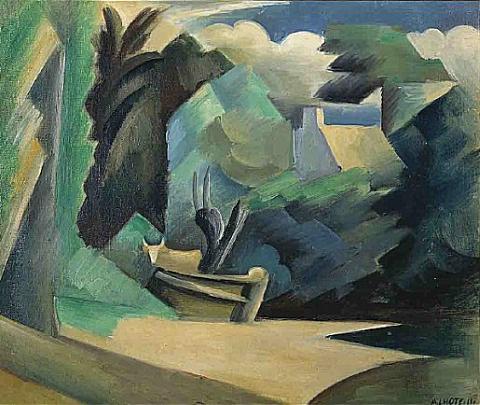
André Lhote
_______________________
As we go through our daily lives, we live largely in the now and in the future. But we stand on a past that still surrounds us in the form of whispers: whispers of old buildings, old objects, old lives. Whispers that, every day, go lost.
Lost Magazine is an online quarterly magazine with a singular mission -- to reclaim in writing lost people, places, and things.
LOST Magazine is all about reclaiming those things that the world has passed by, that may or may not still be whispering around us.
Many topics on which LOST seeks to publish are bittersweet; all are worth remembering, and many are worth celebrating. LOST is a magazine for people who think about lost landscapes, lost albums, lost letters, lost loves, lost elections, lost cultures, lost faith, and lost time. LOST is a magazine for readers who care for how much life exists in what's left and left behind.
_______________________
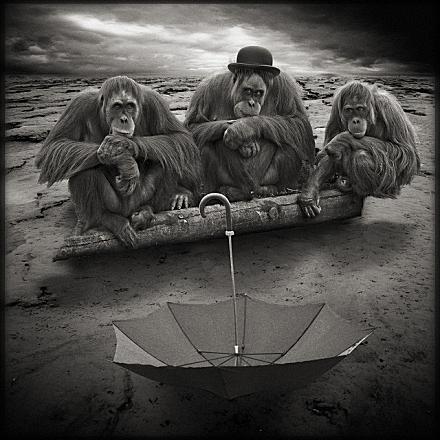 A tribute to Darwin and Kubrick
Yves Lecoq
I don't see umbrellas in my dreams
a tribute to the bumbershoot
Weimar
_______________________
The Harvard Classics
Dr. Eliot's 51 vol. Five Foot Shelf
available in various reader formats
or individually via Project Gutenberg
via Open Culture
_______________________
Suber: Leader of a Leaderless Revolution
Peter Suber interviewed by Richard Poynder
(....)Q: Can you explain the reason why we need OA?
A: Authors need OA to reach all the readers who could build on their work, apply it, extend it, cite it, or make use of it. Readers need OA to find and retrieve everything they need to read and to allow their software prosthetics to process everything they need to process.
OA doesn’t merely share knowledge. It accelerates research by helping authors and readers find one another. It’s compatible with intermediaries but not with intermediaries who erect access barriers to keep authors and readers apart.
Basically we need it to solve a serious access problem hindering researchers both as authors and as readers. But we also need it to seize beautiful opportunities offered by the internet, especially the opportunity to distribute perfect copies of arbitrary files to a worldwide audience at zero marginal cost.
I understand why most novelists, musicians, and movie-makers don’t seize that opportunity. But scholars are not paid for their journal articles and can consent to OA without losing revenue. Any group that can seize this opportunity without losing revenue would be foolish not to do so. Authors who can’t, unfortunately, are in the hard spot of betting their livelihood against the internet.
(....)
There are more experiments with different business models for OA journals in different niches and more recognition that there are many different business models to experiment with. There are more universities and funding agencies willing to pay publication fees at fee-based OA journals—and significantly, these numbers are growing even in a deep recession.
There’s more recognition that supporting OA journals is an investment in a superior way to support research, researchers, research institutions, and peer review. More OA journals are documenting that their conversion to OA increased their submissions and citation impact.
The growing number of conversions from TA to OA suggests to me that small and medium-sized publishers are starting to see OA less as a threat and more as a survival strategy. The big deals are soaking up library budgets, library budgets are flat or declining, and journals excluded from the big deals have little future under the subscription model.
In fact, I see a growing recognition that the subscription model itself is unsustainable in a world in which the volume of published knowledge grows rapidly, and subscription prices grow faster than library budgets and inflation.
I see more funding agencies and governments—not just libraries and universities coming to the conclusion that price barriers to this critically useful literature create harmful access gaps and undermine the public investment in research and peer review.
...(more)
_______________________

André Lhote
_______________________
from Revelator
Ron Silliman
dublin poetry review
Universe
I can taste that I
grew up near, that train‘s
whistle in the distance unmistakable
– in the fireplace a basket
of dried flowers, green rug
echoes couch & chair, remotes
scattered about, even my eyes
adjust gradually to the light
well before dawn, my lens
instead of an onion, unions
dwindled now to eight percent
in the commercial sector, stairs,
doors groan, the slightest touch
if at night, I wake
by Eastern time, street lamp
just visible thru the web
of the plum tree‘s branches
casting shadow more than light
– okay, what‘s next? ...
...(more)

Portrait of a Chartmaker
Pietro Vesconte
dated 1318
The History of Cartography
Edited by J. B. Harley, David Woodward and G. Malcolm Lewis
free pdf from University of Chicago Press

Fresco From The Boscoreale Villa,
Near Pompeii
via
_______________________
Notes from a New Baghdad
Martin Burke
counterpunch
(....)
Certain ones remember that this has happened before
Certain ones choose to forget. The postmen are late with their daily rounds
Because the censor is the only one working overtime.
Is it any wonder then that I have a suspicious heart?
It wasn’t always like this. Once I had time and space for love.
Once I helped clear the gardens of their dead excess. Once I preferred
The Paradise to the Inferno.
Even then certain ‘friends’ called me credulous and naļve but could not convince me
That what I was doing was less than useless and was, in some twisted way,
A collaboration against everything I believed in; and if I listened to
The St Mathew Passion how could I have suspected that one day we would come to live it?
So successful has the changing of the guard been that nothing has happened.
Oh, the rituals continue: children eat ice-cream; a young man opens a girl’s blouse
For the first time, old men in Cafes play cards and curse –but don’t you see, don’t you see-
Everything has changed?
(....)
Nothing is hidden. Everything is happening so that we can see it
Which only means that few bother to look. It’s as if we live in a prelude-time
To something that will happen. Only nothing will happen which isn’t happening now
And because it’s not hidden or covered or denied there is nothing to accuse anyone of
Like water against stone the slow erosion is underway and will not be stopped.
What is happening elsewhere will soon happen here –a new Baghdad,
The Irish route, Green zone and road-blocks –the roundabout way conspirators take
To achieve what they always intended.
...(more)
Burke @ Delphic-Ghent
_______________________

The Balloon
1878
Pįl Szinyei Merse
b. July 4, 1845
_______________________
How to Make a Square Move
Gabriel Josipovici
PN Review 200, Volume 37 Number 6
_______________________
A celebration of the writing and art of Mervyn Peake
Michael Moorcock, China Miéville, Hilary Spurling and AL Kennedy
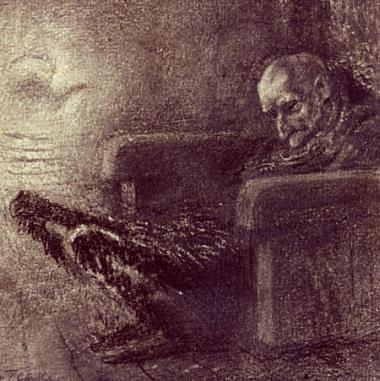
mr. flay
from Titus Groan
illustration by Mervyn Peake
_______________________
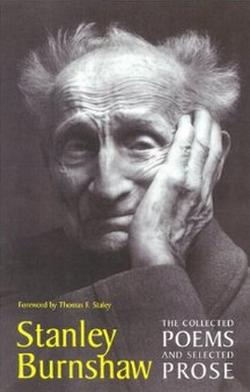
Stanley Burnshaw
(20 June 1906 - 16 September 2005)
The Collected Poems and Selected Prose
Stanley Burnshaw
google books
Stanley Burnshaw at PennSound
Stanley Burnshaw: The Poet in the World
Robert Zaller
jacket2 .....................................................
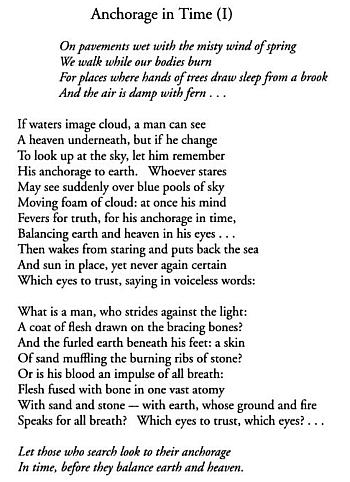
A Stanley Burnshaw Reader
google books
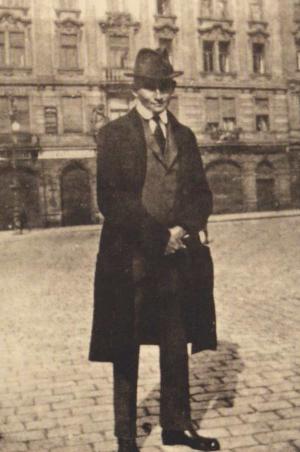
Franz Kafka
July 3, 1883 - June 3, 1924
Prague, 1922
.....................................................
A Message From the Emperor
Franz Kafka
A new translation by Mark Harman
Nobody reaches through here, least of all with a message from one who is dead. –You, however, sit at your window and dream of the message when evening comes. ...(more)
_______________________
A Darning Egg
John Ashbery
He had emerged from the woods. Two poachers fired their rifles above his head. He couldn't restrain his joy.
He danced with the cypress, and stopped.
Cancel the order. The choir of aging starlets that blundered halfway through here tonight shrugged, appalled probably. Wasn't it time to go? Wearily they turned back down the cobalt and terra cotta ramp, singing a song to hoist their spirits, the "marche militaire." Now eyeballs close on the distant porousness. It's not liquor that gets us there.
Think tiny and big, the "experiment perilous."
Evelyn surveyed the shadow. Later, he'd see.
And the heavens, it was all duty after that. Duty calls. Which isn't to say pleasure doesn't too, and louder. My head is so screwed up I can't find your name in the yearbook. Years ago, it was like mist....(more)
The Pip (Project For Innovative Poetry)
_______________________

no mooring
photo - mw
_______________________
Vigils
Ernesto Mejķa Sįnchez
Translated from Spanish by William Carlos Williams
words without borders
(....)
VI
What plunging thoughts
the heart casts upon me,
your own heart. What
patent joy.
What amazement. Under
its bark life has
kept its forms by which
we know it, the egg
from which it was borne.
I desire what at once
I desire and spurn
—to remember, be false to
the present—and consent,
what difference? by you alone
my entrails are scorched.
VII
Pain does not point
either to movement or
movelessness. Thus
sway dancing between
the hurt and the joy
so that I no longer know
whether I live
or swoon. Let me spin
if I would persist.
...(more)
_______________________
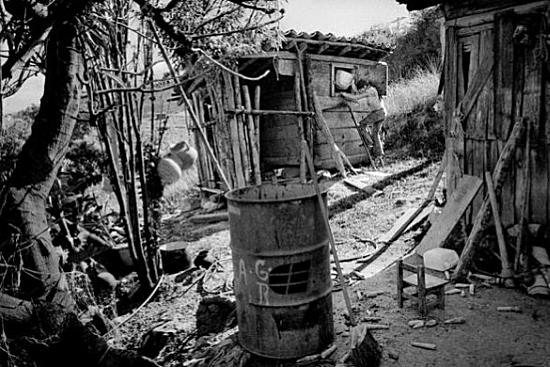
People of the Clouds
Matt Black
Seeing Double
Nina Berman
Two photographers illuminate the effects of migration in a rural village and one’s own body.
guernica
_______________________
Wittgenstein’s awkward nephew
Gabriel Josipovici
(....)
How to live and how to make art in a world without fairy tales - without, that is, the animating myths that have kept us going for so long - that is the question. It is not one the prize jury or the audience wants to hear. Yet the more officialdom dislikes what he has to say, the more he will go on saying it, for that is his way of telling tales in a world from which tales have disappeared. The late interview from which I quoted is quite clear on this score:
Whatever you write it's always a catastrophe. That's the depressing thing about the fate of a writer . . . All you deliver is a bad, ridiculous copy of what you had imagined . . . It's especially hard in the German language, because that language is wooden, clumsy, disgusting. A terrible language that kills anything light and wonderful. The only thing one can do is sublimate that language with a rhythm to give it musicality.
Thank goodness for Thomas Bernhard, the most truthful, the funniest and the most musical of writers since Marcel Proust....(more)
_______________________

photo - mw
_______________________
Festival of the Trees 61: new discoveries
hosted by Dave Bonta (Via Negativa)
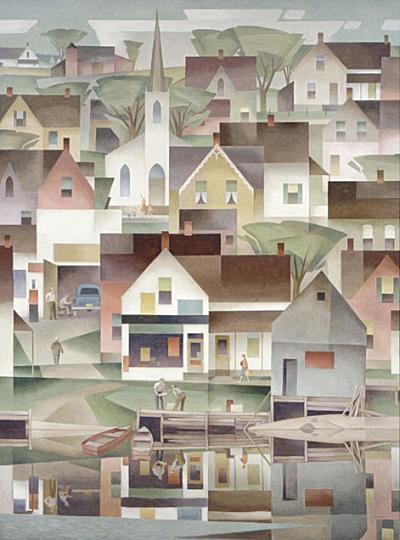
A. J. Casson
1898-1992
_______________________
Happy Canada Day
_______________________
a bird in the house
Robin Blaser
from Streams II
the truth flies hungry, at least and otherous,
of which--though it may be one--Kafka said troublingly,
it has many faces
it's
the faces one wants, tripping the light shadows of its
skin colours of its wordy swiftness, angry and solvent,
of its loud remarks
as of feeding flocks one
year, one, among the smallest birds in the Northwest, flew
into the house a darting, panic thought at the walls
and grasses perched on the top right corner of the frame
of Tom Field's painting wherein adulterous Genji is found
out--as Lady Murasaki reads from her blue scroll--and
permitted me to take it in my hand soft, intricate
mind honouring and lift it out into the air
and the next year, again, one flew into the house,
almost certain, like a visitor, gold-crowned winged
floating about odd discoveries and alighted on the brim
of the lasagna dish my hand trembled as I took it up
and moved slowly to lift it out of the window into
the air a kind of thinking like everybody else
looking for a continuing contravention of limits and
of substance
Robin Blaser at EPC
_______________________
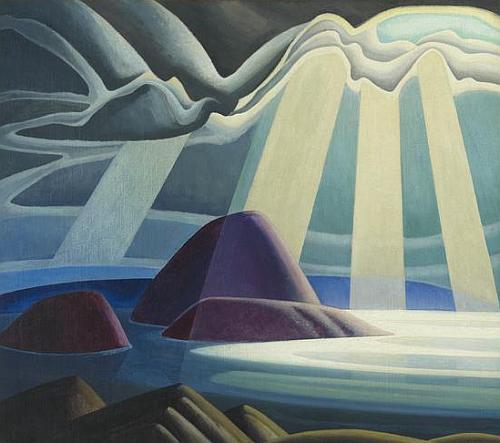
Lake Superior
Lawren S. Harris
(1923)
_______________________
Prayer for Geography
Meredith Quartermain
To all who fall
to matter
write the earth
a space of white
break of bread
plates break in relief
write stones cocks cry
to collected waters
or hollow fire of iron.
Eat atmosphere, a garland
sift on a drift
post out the earth's hearth
to horizon and swallow heat
of antipodes
plants ride out in leaves
to mirror oceans
to finger rivers tribulations
smooth away our tombs.
Figures of earth, press out our bodies.
Strange our urge into that which takes stand.
Distribute our loom
work through the scape the seek of air
each ear our forgotten art.
For these are our herdsmen
and without this earth as
risk we have no
right of river hear
our three yonders a sphere
of being of geography to the
ring of ocean above them
the maps antipodean
tenderness in all who fall
to matter who come simply
to throw shadows on the moon's
shifting horizon who
devote constellations to the ends
of the earth wide
from the road of symmetry.
Meredith Quartermain at EPC
_______________________
Poetries of Canada
The East Village Poetry Web
_______________________

The Ice House
Coldwell, Lake Superior
Lawren S. Harris
1885-1970
_______________________
The Weather
John Newlove
1938 - 2003
From: Apology for Absence: Selected Poems 1962-1992
I'd like to live a slower life.
The weather gets in my words
and I want them dry. Line after line
writes itself on my face, not a grace
of age but wrinkled humour. I laugh
more than I should or more
than anyone should. This is good.
But guess again. Everyone leans, each
on each other. This is a life
without an image. But only
because nothing does much more
than just resemble. Do the shamans
do what they say they do, dancing?
This is epistemology.
This is guesswork, this is love,
this is giving up gorgeousness to please you,
you beautiful dead to be. God bless
the weather and the words. Any words. Any weather.
And where or whom. I'd never taken count before.
I wish I had. And then
I did. And here
the weather wrote again.
|
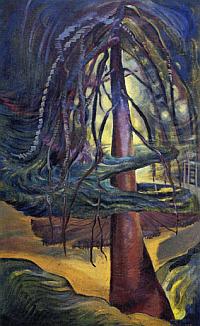
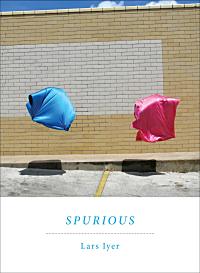


 The Age of Briggs & Stratton
The Age of Briggs & Stratton






































